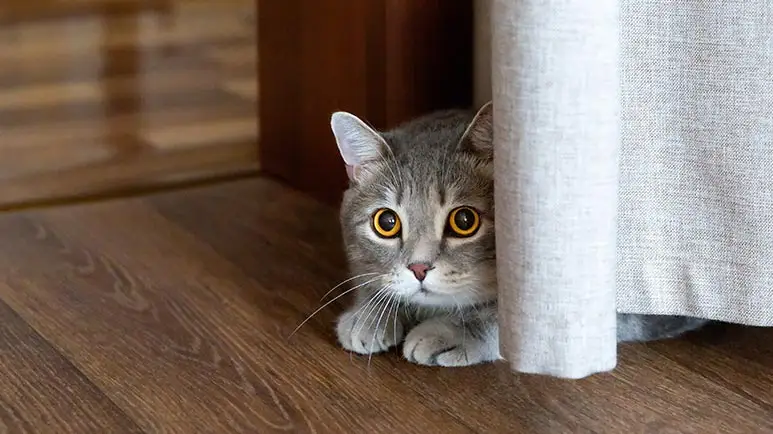Calm Your Anxious Cat with These Simple Solutions
Your kitty might seem calm on the outside, but could actually be suffering silently from stress. Learn to spot the signs and calm them down with these remedies.

STORY AT-A-GLANCE
- Cats can experience anxiety from various triggers including environmental changes, new pets/babies, territorial disputes, loss of family members and unfamiliar people or situations
- Common signs of feline anxiety include excessive vocalization, overgrooming, lethargy, inappropriate urination, aggressive behavior, trembling, dilated pupils and changes in eating habits
- Create a safe environment by providing hiding spots, engaging in regular playtime, and playing calming music to help reduce your cat's anxiety levels
- Pheromone products and gentle scents like flower essences can help calm cats, while essential oils should be used cautiously as cats are highly sensitive to them
- Natural remedies for cat anxiety include melatonin, chamomile, skullcap, valerian root and Tulsi. Consult a veterinarian before administering any supplements to your pet
Unlike dogs, which can become quite expressive whenever something is stressing and bothering them, cats are usually docile creatures. But, like dogs and humans, cats can also experience stress and anxiety, and if you’re not observant, it’s likely that you’ve missed out on the signs that something is bothering your feline friend.
What Causes Anxiety in Cats?
Feline anxiety can be triggered by different factors, such as changes in their environment, meeting unfamiliar people or even dealing with health conditions. Below are a few common triggers to keep in mind:1
- Environment and living space — Cats dislike having their food and water bowls close to their litterbox. If their litterbox isn’t cleaned properly, they can also become stressed. Cats are also territorial, and prefer having their own individual space where they can escape from other pets.
- Moving/location changes — Did you move to a new home? Perhaps you’ve rearranged your furniture? Cats prefer familiarity, so any changes to your home can make them uneasy.
- New pet or new baby — If you’ve recently adopted a new pet or have given birth, your cat may feel stressed, as they know your attention will not be focused on just them.
- Another cat in the neighborhood — Did a new neighbor with a cat move in next door? Your cat may feel threatened, knowing that there’s another feline in the neighborhood.
- Loss of a family member — If you’ve recently lost a member of your family or another pet, your cat may grieve and become stressed.
Signs of Anxiety in Cats
Feline anxiety manifests in various ways. Some cats suffer in silence, while others show noticeable behaviors. Here are some symptoms to keep an eye out for:2
- Lethargy or sleeping more frequently
- Overgrooming (can result in bald patches)
- Excessive vocalization (yowling, hissing or growling)
- Rapid breathing
- Trembling or shaking
- Dilated pupils
- Ears lowered flat against their head
- Crouching down more frequently
- Vomiting and diarrhea
- Urinating outside their litterbox and around the house
- Licking their nose frequently
- Weight gain or weight loss
- Eating non-food items
- Constant meowing
- Aggressive behavior (directed toward you or other pets)
- Scratching furniture
- Pacing around the house
- Easily startled (by noises or movement)
How to Address Anxiety in Cats
If you have a stressed cat in your home, a comprehensive approach may be necessary to calm them down. You will need to be gentle and patient so as to not create further anxiety in your pet.
Creating a safe, comfortable environment is the first step. Cats need to feel secure when anxious, so offer hiding spots like boxes or pet tents where they can retreat until they’ve calmed down. Here are other strategies you can try:3
- Provide opportunities for regular playtime — Spend time with them, and use positive reinforcements like treats or toys if needed. However, don’t force them to play if they don’t want to. Coax them gently and let them approach you first.
- Play calming music — Soft classical music can be a calming distraction for cats (avoid loud music).
- Try pheromones — These are invisible chemicals emitted by animals that affect the behavior of other animals of the same species. Aside from delivering messages, they also help ease tension in animals.
Feliway Friends™ is a pheromone product that you can purchase today. Consider using a diffuser for better effectiveness. - Use flower essences — Since cats are highly sensitive to scents, using products that are gentle enough without being overpowering is helpful, and flower essences can provide that. You can add it to their water or apply it on them topically.
- Essential oils — It’s best to consult with your holistic veterinarian before using essential oils around cats, as they are very sensitive to these products. Select oil blends specifically formulated for safe diffusion around cats. German chamomile, lavender, clary sage, ylang ylang and frankincense are said to be safe for cats.
Always choose a water diffusion method and make sure your cat can leave the room the diffuser is in, if they choose to. Hydrosols are also a safer choice for cats.
Try Herbal Remedies and Nutraceuticals for Anxiety
There are some herbs and nutraceuticals that can naturally calm your pets, and especially provide immense advantages to your feline friends. Below are some examples — make sure to look for animal products and consult with your veterinarian before giving it to your pet:4
- Melatonin — Aside from easing anxiety, melatonin promotes restful sleep in humans,5 and may work for cats,6 too.
- Chamomile — Humans drink chamomile tea before bedtime to ease stress;7 in cats, it can also have anxiety-relieving advantages.
- Skullcap — An herb that’s used in traditional Chinese medicine (TCM), it has a calming effect that works against stress and anxiety.8 Make sure to use skullcap formulations made for pets.
- Valerian root — Just like melatonin, valerian is also well-known for promoting sleep and banishing anxiety.9
- Tulsi (Holy basil) — A widely used herb in Ayurvedic medicine, Tulsi helps counter psychological and emotional stress.10
Sources and References
- 1,3 Montecito Animal Clinic, October 12, 2024
- 2 Feliway, Signs of anxiety in cats to watch for — is your pet concerned?
- 4 Pet MD, May 9, 2023
- 5 Int. J. Mol. Sci. 2022, 23(24), 16187
- 6 J Feline Med Surg. 2022 Nov 9;24(12):e524-e534
- 7 Clin Nutr Res. 2024 Apr 23;13(2):139-147
- 8 Daru. 2022 Dec;30(2):351-366
- 9 Phytother Res. 2019 Apr;33(4):939-948
- 10 J Ayurveda Integr Med. 2014 Oct-Dec; 5(4): 251-259











